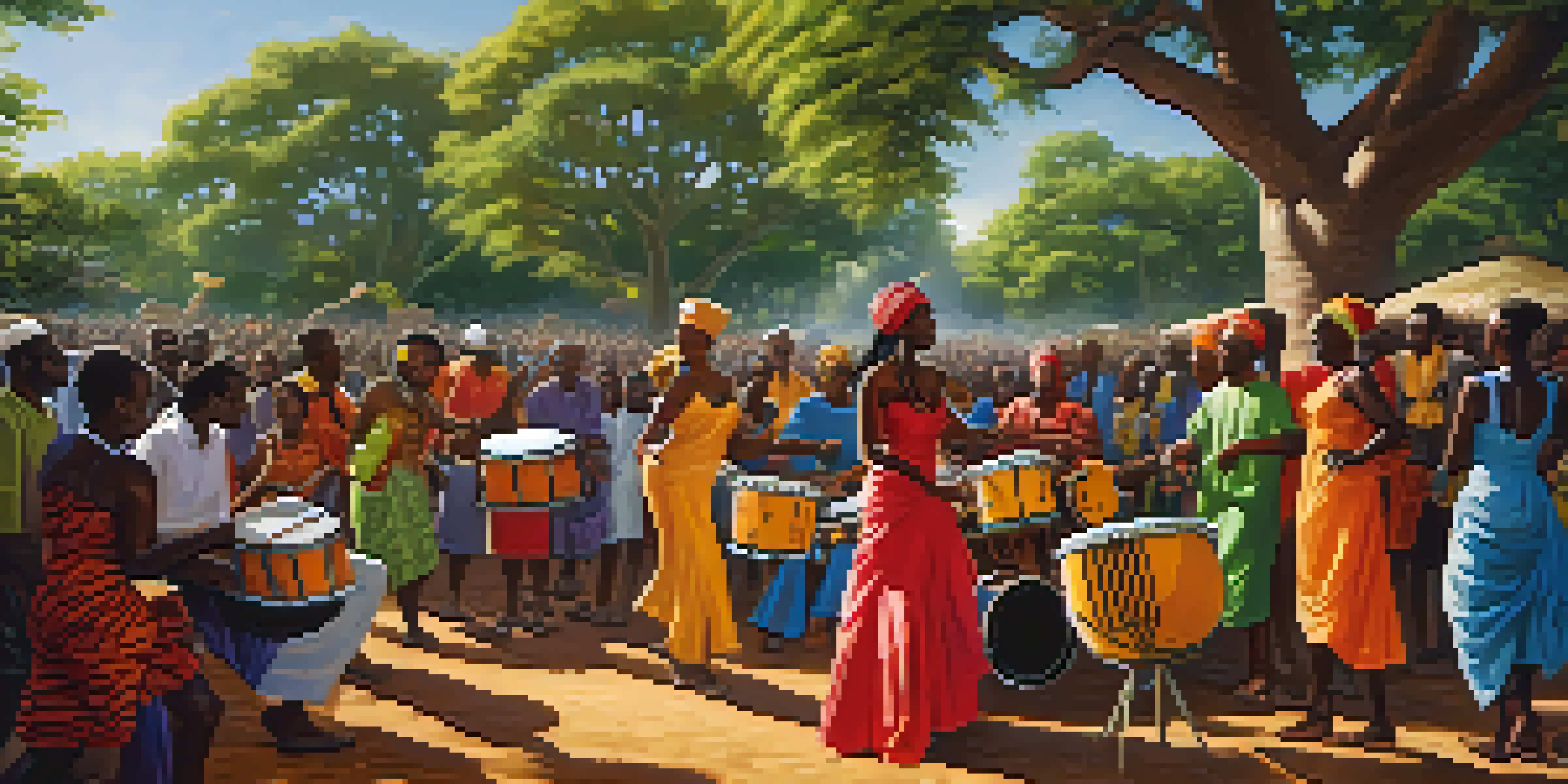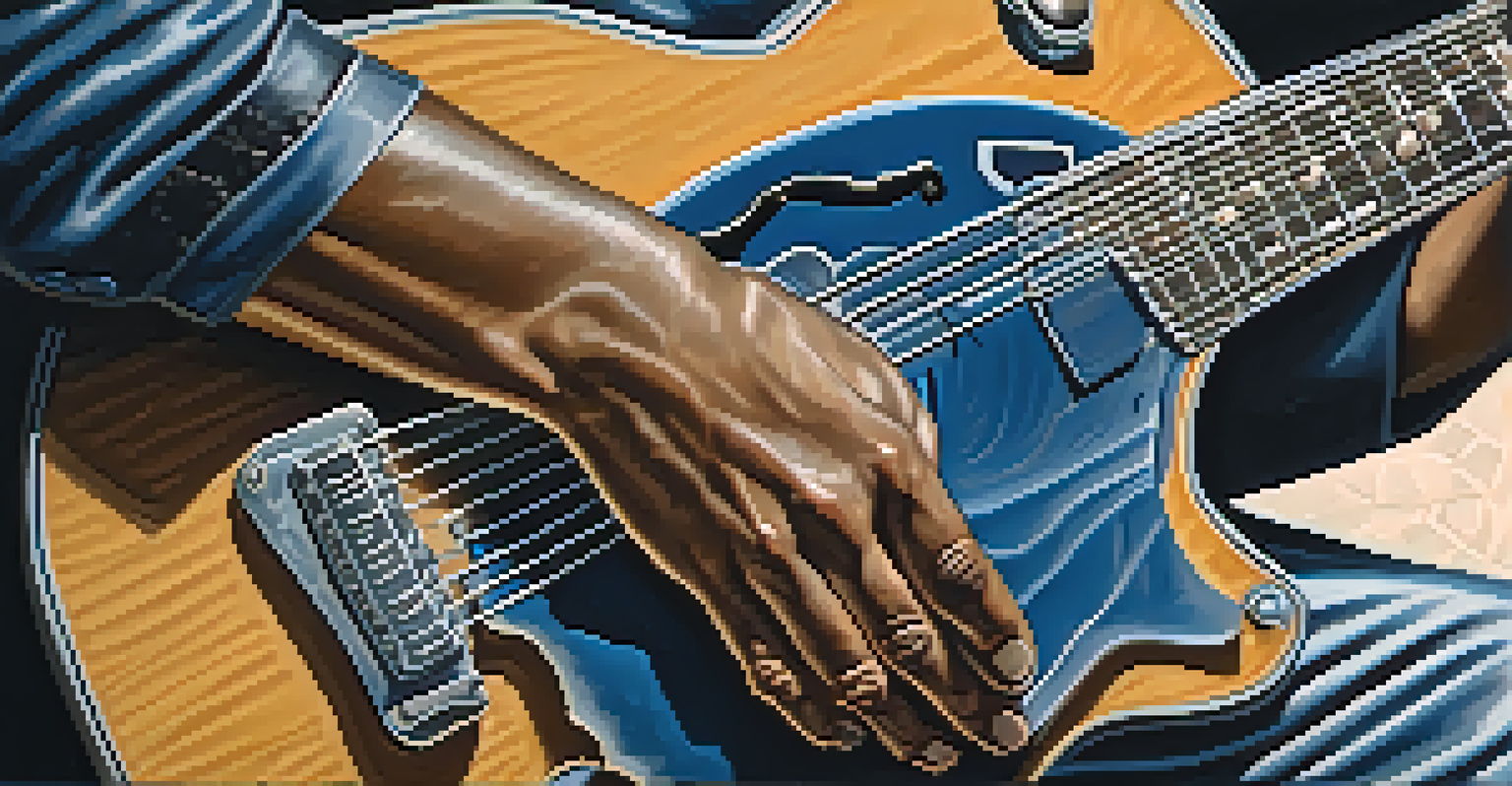The Influence of African Rhythms on American Blues Guitar

The Roots of African Music: A Cultural Overview
African music is rich with diverse rhythms, instruments, and traditions that stretch back thousands of years. These musical elements were deeply tied to community life, storytelling, and spiritual practices. As enslaved Africans were brought to America, they carried these vibrant musical traditions with them, laying the groundwork for new genres.
Music is the shorthand of emotion.
In many African cultures, music is not just entertainment; it plays a crucial role in social and religious ceremonies. Drumming, singing, and dancing are often intertwined, creating a communal experience that resonates deeply with participants. This sense of rhythm and community found its way into the music of African American communities.
Understanding these roots is essential to appreciating the evolution of American music. The influence of African rhythms set the stage for the birth of blues, a genre that would become a pivotal part of American cultural identity.
The Birth of Blues: A Fusion of Cultures
Blues music emerged in the late 19th and early 20th centuries, primarily from African American communities in the Deep South. It was a genre born out of hardship and resilience, combining African musical traditions with European influences. This fusion created a unique sound characterized by its expressive guitar riffs and soulful vocals.

The use of call-and-response patterns, a hallmark of African music, is prominently featured in blues. This interactive element invites a dialogue between the performer and the audience, creating an engaging atmosphere. For instance, a guitarist might play a phrase, and the audience or another musician responds, echoing the interaction found in traditional African music.
African Roots Shape American Blues
The vibrant musical traditions brought by enslaved Africans laid the groundwork for the evolution of blues music in America.
This blend of cultures not only shaped the sound of blues but also its emotional depth. The storytelling aspect of blues lyrics often reflects the struggles of daily life, echoing the narratives found in African musical traditions.
Rhythmic Patterns: The Heartbeat of Blues Guitar
At the core of blues guitar lies a rhythmic complexity that can be traced back to African drumming. The use of syncopation, where the emphasis is placed on unexpected beats, creates a vibrant and lively sound. This rhythmic foundation allows guitarists to express a range of emotions, from sorrowful cries to joyous celebrations.
The blues is a natural fact, is a woman, is a child, is a mother, is a father, is a friend, is a lover, is a way of life.
Many blues guitarists employ techniques such as slide guitar and fingerpicking, which add layers of texture to their playing. These techniques reflect the intricate rhythms found in African music, where the interplay between the bass and treble lines creates a rich tapestry of sounds. The result is a style that is both dynamic and deeply expressive.
For instance, artists like Robert Johnson and Muddy Waters exemplify how African rhythmic influences can be heard in their guitar playing. Their music captures the essence of the blues while paying homage to their African roots.
Instruments: The Bridge Between Cultures
The instruments used in blues music also reveal a connection to African traditions. The guitar, while not originally African, was adapted and transformed by African American musicians, who brought their unique playing styles and techniques. The incorporation of slide guitars and resonator guitars added a distinctive sound that became synonymous with the blues genre.
Additionally, percussive elements, such as handclaps and foot stomping, reflect the rhythmic traditions of African music. These elements are often used in live performances, creating a lively atmosphere that invites audience participation. This communal experience mirrors the social nature of African musical traditions.
Blues: A Fusion of Cultures
Blues music emerged as a unique blend of African and European musical influences, characterized by expressive guitar riffs and soulful storytelling.
In essence, the evolution of instruments used in blues highlights the ongoing dialogue between African and American musical practices. This blend has allowed blues to flourish and evolve, creating a legacy that continues to influence musicians today.
Iconic Blues Artists and Their African Influences
Many iconic blues artists have drawn heavily from African musical influences, shaping their styles and sounds. Legends like B.B. King and Howlin' Wolf incorporated elements of African rhythm and melody, creating music that resonates with audiences worldwide. Their work serves as a testament to the enduring legacy of African musical traditions.
For instance, B.B. King's expressive string bends and vibrato are not just technical skills; they reflect the emotional storytelling tradition found in African music. Similarly, Howlin' Wolf's powerful vocal delivery captures the essence of call-and-response, creating a connection with listeners that transcends generations.
These artists not only honor their roots but also introduce the richness of African music to broader audiences. Their contributions have played a vital role in keeping the spirit of African rhythms alive within the blues genre.
Modern Blues: Continuing the Legacy
Today, modern blues artists continue to draw inspiration from the rich tapestry of African rhythms. Contemporary musicians blend traditional blues with various genres, such as rock, jazz, and hip-hop, creating a dynamic sound that appeals to new generations. This evolution reflects the genre's adaptability and its deep roots in African musical traditions.
Artists like Gary Clark Jr. and Joe Bonamassa showcase how African rhythmic influences thrive in today's music. Their innovative approaches to guitar playing and songwriting highlight the ongoing relationship between past and present, demonstrating that the spirit of blues is alive and well.
Modern Blues Reflects Cultural Legacy
Contemporary blues artists continue to draw inspiration from African rhythms, showcasing the genre's adaptability and deep cultural roots.
As music continues to evolve, the connection to African rhythms remains a vital part of the blues narrative. This ongoing dialogue not only honors the past but also propels the genre into the future, ensuring its relevance in the ever-changing landscape of music.
The Cultural Significance of Blues and African Rhythms
The cultural significance of blues extends beyond just music; it embodies a rich history that reflects the African American experience. The genre serves as a powerful medium for storytelling, allowing artists to express their struggles and triumphs. This connection to African rhythms adds depth and authenticity to these narratives.
As blues music continues to influence various genres, its roots in African musical traditions remind us of the importance of cultural heritage. The rhythmic patterns and emotional expression found in blues serve as a bridge between past and present, fostering appreciation for the diverse influences that shape our music.

In celebrating the influence of African rhythms on American blues guitar, we not only honor the artistry of musicians but also acknowledge the cultural journeys that have shaped this genre. The blues stands as a testament to resilience, creativity, and the enduring power of music to unite and inspire.